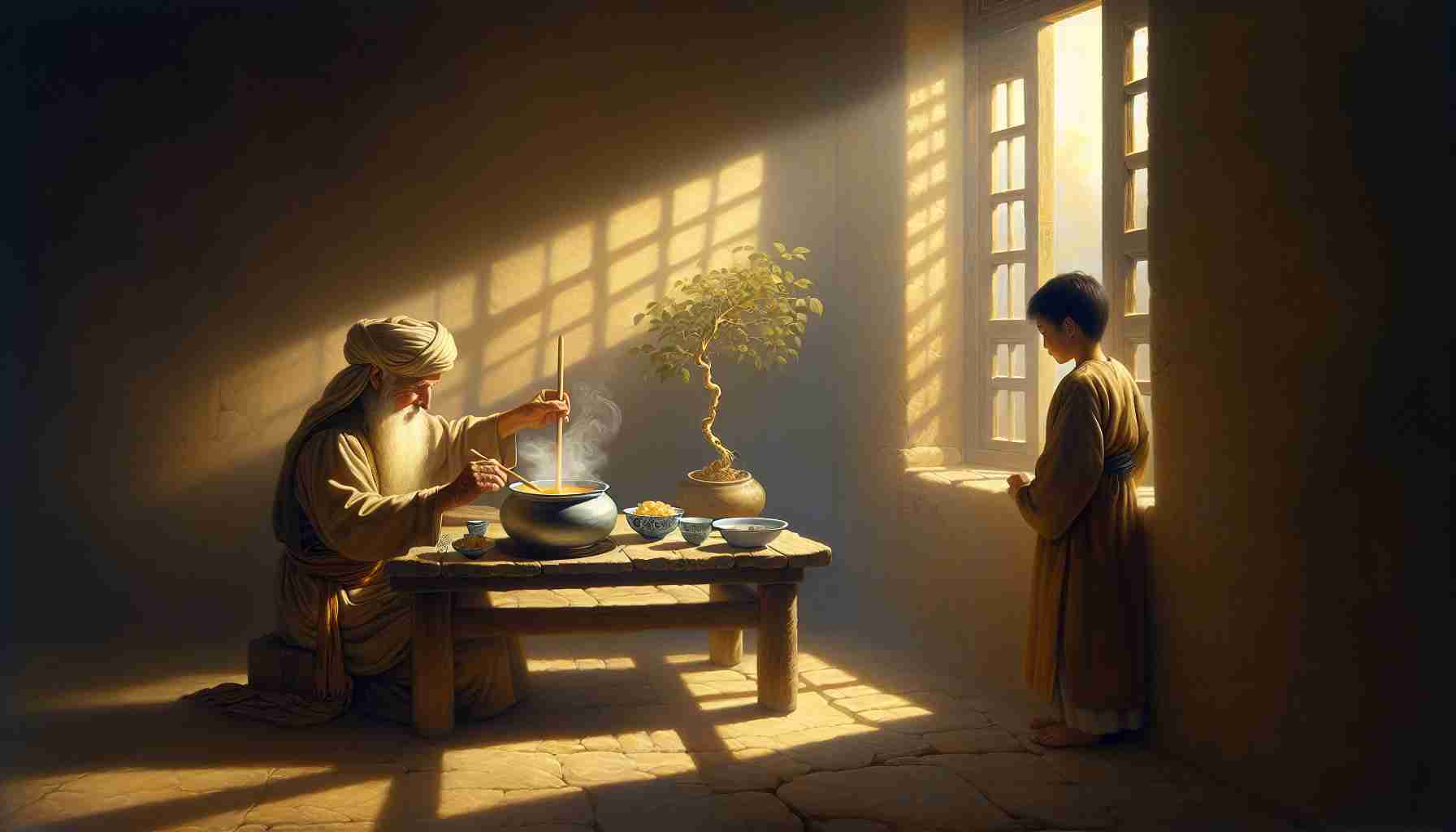

I had always believed that the best meals came from the most complicated recipes. My mother was a cook in the Emperor’s palace, and I tried to follow in her footsteps by turning every meal into a grand performance. Sizzling flames, rare ingredients, loud clanging—my kitchen was always a storm.
But nothing ever tasted... right.
One summer afternoon, after a stew that burned and a rice bowl that was too salty, I threw my spoon down in frustration and walked outside. The air was thick with heat, but I needed space to think. “Why do I try so hard,” I muttered, “and still fail?”
I wandered farther than ever before, past the last houses in the village and toward the mountain path. There, I saw an old man squatting quietly beside a small pot. The smell that came from it made my mouth water.
“Smells good,” I said, trying not to seem too hungry.
The old man looked up and smiled. “Would you like to try some?”
I nodded, and he handed me a bowl. I took a bite—and my eyes widened. It was perfect. Warm, balanced, soothing. But there was no firewood, no noise, no tools scattered about. Just the old man and the pot.
“What’s your secret?” I asked.
The man chuckled. “There’s no secret. I don’t fight the food.”
I blinked. “You don’t... fight it?”
He stirred the pot gently, not even looking. “Everything has its own nature. Hot soup cools. Rice softens in water. I only help it become what it already wants to be.”
I didn’t fully understand, but I watched closely as he prepared the next dish. He moved slowly but surely—adding herbs when the breeze came, stirring only when the steam rose just right. He wasn’t rushing or using tricks. He was just... there.
We sat in silence while the soup cooked. A root twisted out from beneath the soil beside us, curling like it was stretching toward the sky. The old man looked at it and said, “Some roots search for water in deep soil. They wander. But they don’t chase—they grow naturally. That’s how we should live, too.”
“Like the root?” I asked.
He nodded. “Let the Way guide you, not your fight.”
I returned to my kitchen the next day. I didn’t slam pots or reach for dozens of spices. I just watched. I listened. I let the water boil before adding rice. I used the vegetables I had, not the ones I wished for. Slowly, the food began to taste better—more whole and true.
I still cook now, many years later. People ask me for my recipes, but I smile and say, “There’s no recipe—only the Way.”
I didn’t change overnight. But now, whenever I feel the need to control every step, I remember the old man’s pot and the wandering root. I breathe. I let go. I let things take their shape.
And just like that, the flavor returns.
I had always believed that the best meals came from the most complicated recipes. My mother was a cook in the Emperor’s palace, and I tried to follow in her footsteps by turning every meal into a grand performance. Sizzling flames, rare ingredients, loud clanging—my kitchen was always a storm.
But nothing ever tasted... right.
One summer afternoon, after a stew that burned and a rice bowl that was too salty, I threw my spoon down in frustration and walked outside. The air was thick with heat, but I needed space to think. “Why do I try so hard,” I muttered, “and still fail?”
I wandered farther than ever before, past the last houses in the village and toward the mountain path. There, I saw an old man squatting quietly beside a small pot. The smell that came from it made my mouth water.
“Smells good,” I said, trying not to seem too hungry.
The old man looked up and smiled. “Would you like to try some?”
I nodded, and he handed me a bowl. I took a bite—and my eyes widened. It was perfect. Warm, balanced, soothing. But there was no firewood, no noise, no tools scattered about. Just the old man and the pot.
“What’s your secret?” I asked.
The man chuckled. “There’s no secret. I don’t fight the food.”
I blinked. “You don’t... fight it?”
He stirred the pot gently, not even looking. “Everything has its own nature. Hot soup cools. Rice softens in water. I only help it become what it already wants to be.”
I didn’t fully understand, but I watched closely as he prepared the next dish. He moved slowly but surely—adding herbs when the breeze came, stirring only when the steam rose just right. He wasn’t rushing or using tricks. He was just... there.
We sat in silence while the soup cooked. A root twisted out from beneath the soil beside us, curling like it was stretching toward the sky. The old man looked at it and said, “Some roots search for water in deep soil. They wander. But they don’t chase—they grow naturally. That’s how we should live, too.”
“Like the root?” I asked.
He nodded. “Let the Way guide you, not your fight.”
I returned to my kitchen the next day. I didn’t slam pots or reach for dozens of spices. I just watched. I listened. I let the water boil before adding rice. I used the vegetables I had, not the ones I wished for. Slowly, the food began to taste better—more whole and true.
I still cook now, many years later. People ask me for my recipes, but I smile and say, “There’s no recipe—only the Way.”
I didn’t change overnight. But now, whenever I feel the need to control every step, I remember the old man’s pot and the wandering root. I breathe. I let go. I let things take their shape.
And just like that, the flavor returns.